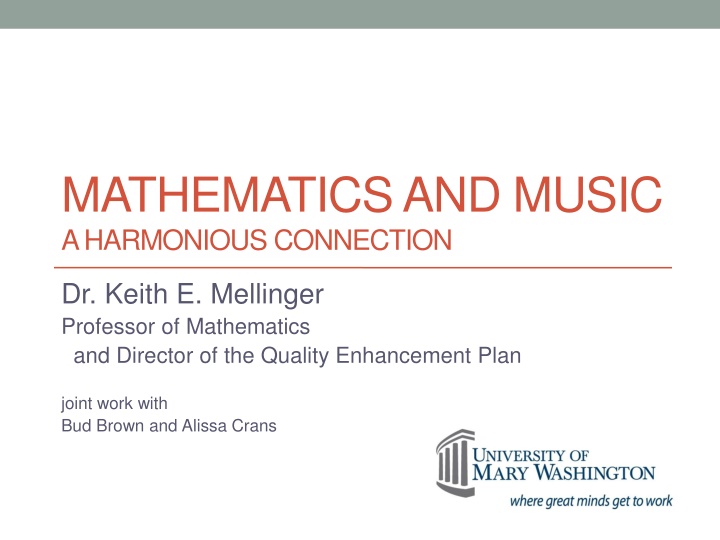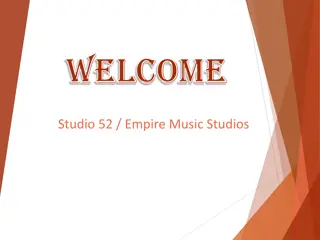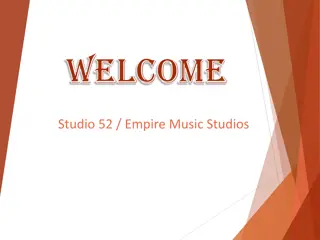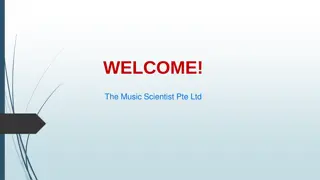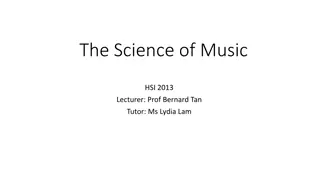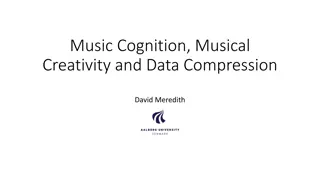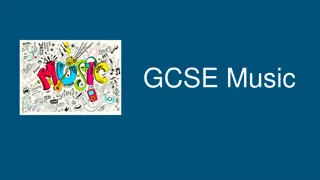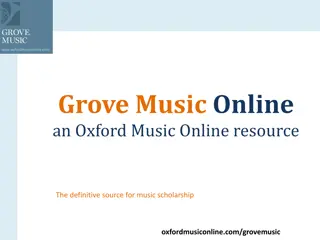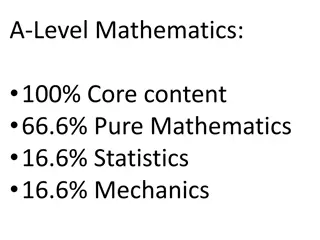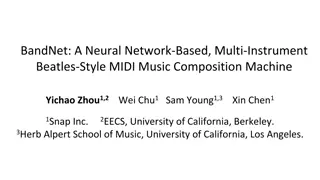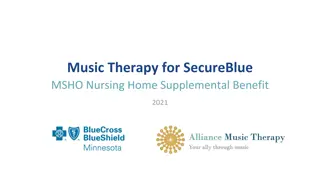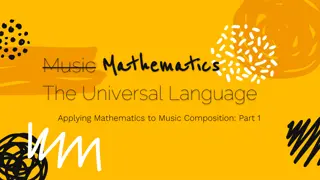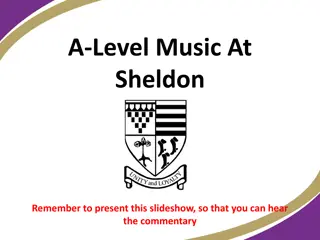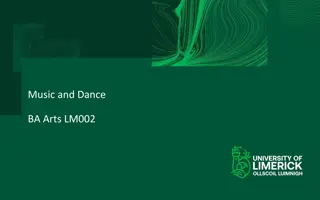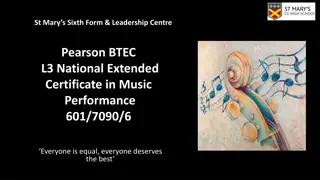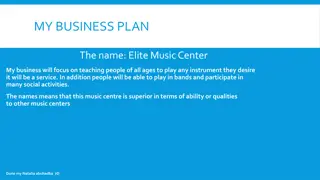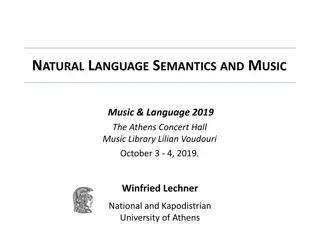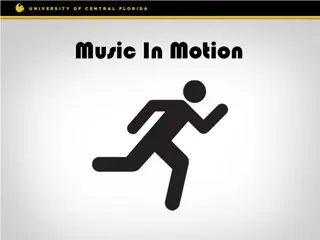The Harmonious Connection Between Mathematics and Music
Explore the fascinating relationship between mathematics and music through concepts like triads, chord progressions, and operations on triads defined by music theorist Hugo Riemann. Delve into the mathematical descriptions of chord progressions, major and minor chords, and chord transformations, unveiling the intricate harmony between two seemingly distinct disciplines.
Download Presentation

Please find below an Image/Link to download the presentation.
The content on the website is provided AS IS for your information and personal use only. It may not be sold, licensed, or shared on other websites without obtaining consent from the author.If you encounter any issues during the download, it is possible that the publisher has removed the file from their server.
You are allowed to download the files provided on this website for personal or commercial use, subject to the condition that they are used lawfully. All files are the property of their respective owners.
The content on the website is provided AS IS for your information and personal use only. It may not be sold, licensed, or shared on other websites without obtaining consent from the author.
E N D
Presentation Transcript
MATHEMATICS AND MUSIC A HARMONIOUS CONNECTION Dr. Keith E. Mellinger Professor of Mathematics and Director of the Quality Enhancement Plan joint work with Bud Brown and Alissa Crans
What is a triad? By a triad, or chord, we mean three pitches played simultaneously For instance, a C-Major triad consists of the pitches C, E and G. an a-minor triad consists of the pitches A, C, and E. We represent triads as vectors over Z12 C-Major = < 0, 4, 7 > a-minor = < 4, 0, 9 >
Hugo Riemann Karl Wilhelm Julius Hugo Riemann (July 18, 1849 July 10, 1919) was a German music theorist and composer. Bernhard Riemann (the Riemann Sum guy)
Operations on triads The 19th century music theorist Hugo Riemann defined these operations P parallel, L leading tone exchange, and R relative Examples: P(C-Major) = c-minor L(C-Major) = e-minor R(C-Major) = a-minor
Mathematical descriptions of chord progressions C-Major a-minor F-Major G-Major C R(C) L(R(C)) T2(L(R(C))) Stand by Me Every Breath you Take Those Magic Changes Eternal Flame
Majors and minors C G Am F C Speaking words of wisdom, let it be When I find myself in times of trouble, mother Mary comes to me G F C
The operator P parallel minor Image under P Original triad C minor C major < 0, 3, 7 > < 0, 4, 7 >
The operator L leading tone exchange Original triad Image under P C major E minor < 0, 4, 7 > < 11, 4, 7 >
The operator R relative minor Image under P Original triad A minor C major < 0, 4, 9 > < 0, 4, 7 >
Matrix Representations Linear operation Matrix representation Under the operation P 0 0 1 1 1 0 0 [x, y, z] = 1 1 < x, y, z > < z, x y + z, x > [z, x-y+z, x]
Musical actions of dihedral groups Winner of the Hasse Award Year of Award: 2011 The American Mathematical Monthly, vol. 116, no. 6, June 2009, pp. 479-495.
What is an eigenvector? Matrices move vectors Some matrices do this 1 2 0 3,1 = [2,6] 1 1,2 1 2 2 = 3,6 = 3 [1,2] 1
The study of matrices and vectors lies in an area we call Linear Algebra. Just as chords can be modeled with vectors, so too can many other things. This allows us to use mathematics to study these objects.
Linear Algebra is used all over the place! Cryptography Error-correcting codes Linear modeling
Eigenvectorsureigentriads? We can consider musical triads that act as eigenvectors under one of these operators. We want to know what sort of triad can satisfy: P(v) = kv where k is a scalar
Triads in terms of thirds Major and minor thirds Major and minor triads A major third is 4 half steps A Major triad is a major third followed by a minor third A minor triad is a minor third followed by a major third A minor third is 3 half steps
on the piano a major triad a minor triad
Eigentriads Major and minor triads never show up as eigentriads Eigentriads need to have more evenly spaced notes So, what kind of triad consists of a pair of either major thirds or minor thirds?
Diminished and Augmented chords A diminished chord is a pair of stacked minor thirds An augmented chord is a pair of stacked major thirds
Diminished chords Major 4 + 3 Diminished 3 + 3
Michelle (The Beatles) D Michelle, ma belle C these are words that go together well, D A my Michelle Gm Ddim A
All Star (Smash Mouth) Simple version: E Hey now, you're an all-star, get your game on, go play A B A With diminished: E Hey now, you're an all-star, get your game on, go play A A#dim A
As a transition chord Diminished chords also act as a nice transition between a whole step Example in Jingle Bell Rock: D jingle around the clock... D#dim Em Rather than D Em, use D D#dim Em
American Tune (Paul Simon) C And I dreamed I was dying And I dreamed that my soul rose unexpectedly G And looking back down at me F C G Smiled reassuringly G Am Ddim
Augmented chords Major 4 + 3 Augmented 4 + 4
From Me to You (The Beatles) Gm I got arms that long to hold you F and keep you by my side. D7 I got lips that long to kiss you G And keep you satisfied C7 G+
Baby Hold On To Me (Eddie Money) D D+ Baby hold on___ to me__ Whatever will be__ will be__ The future is ours___ to see__ So baby hold on___ to me__
Goodnight Saigon (Billy Joel) Am We Em held the day in the palm of our hand. C Dm E Dm E Am They ruled the night and the night seemed to last Em C Dm E Dm C+
Why these triads? It does make some sense. The augmented and diminished triads consist of notes that are evenly spaced. When you scalar multiply them, that spacing is maintained. From the matrix definition, when you operate on them, two coordinates are retained, and so the image will retain some of that structure as well.
Possible musical meaning A possible musical reason for the augmented and diminished chords being eigentriads is that they do not change form, and therefore cannot stand alone melodically. The Major and minor triads can and do change parity under these three fundamental transformations: they can move and change into something else. But the augmented and diminished triads are stuck.
Other Eigentriads? P, L and R have many eigentriads, other than those we have already mentioned. However, most have no meaning musically (at least in Western music). For example, <7, 5, 6> is an eigenvector under R (with eigenvalue 11). These collections of pitches could very well play a role in the music of other cultures.
Thank you Thanks the Fennemores for their kind invitation to speak to you today. Thanks to my collaborators, Bud Brown and Alissa Crans Thanks for your attention
